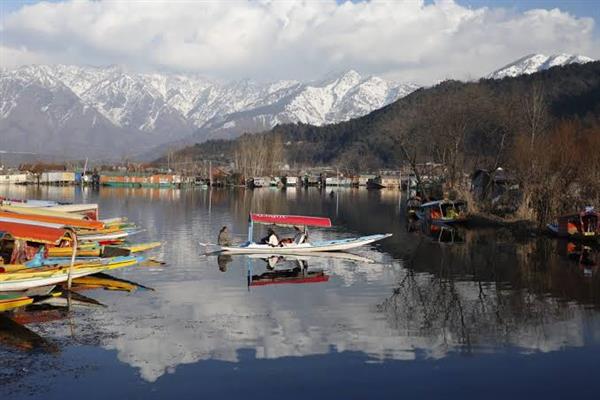By: Syed Mohammad Burhan
Srinagar: Nauroz, the festival of spring and the first day in the Persian New Year is celebrated across Central Asia. Pertinently, Nauroz starts at the exact moment of the vernal equinox, commencing the start of the spring. Exact moment of the vernal equinox in Srinagar, commonly known as ‘Tahvil’, this year (20th March 2024) was at 08:36:26 a.m. on Wednesday.
In Kashmir however, the festival has sadly attained sectarian connotation and this has decreased its significance for the general public.
“It is sad Nauroz in Kashmir has been associated with a sect and seen from a sectarian perspective”, said Prof G. N. Khaki, former Director of the Centre of Central Asian Studies at the University of Kashmir. Prof Khaki believes that this spring festival belongs to the whole Muslim community.
“This year, it is coinciding with the month of Ramazan, which has doubled its essence, and we should be grateful to God for the kind of bounties he has provided us with. Life is infused into all things on this day and it signifies rebirth” he said.
He further said that there is nothing wrong in celebrating cultural festivities as long as they do not clash with the religious beliefs. Imam Abu Hanifa (r.a) has put it rightly, quotes Prof Khaki, “As long as traditions do not contradict Islamic fundamentals and beliefs, we can continue with them”.
According to Dr. Abid Gulzar, Assistant Professor at the CCAS Kashmir University, “It is primarily celebrated in the countries where the Persian empire shared the arc of influence and political authority for long periods of time.
Reflecting on Islamic teachings, Dr. Gulzar asserted that Islam never opposes cultural festivities and the indigenous festival of a place. He drew a historical parallel, stating, “Even when we look at the history of Islam, Prophet Muhammad (P.b.u.h) did not change the names of people after they embraced Islam because changing names after embracing faith is not necessary and is not an essential matter of the faith.”
But in Kashmir, we saw hundreds of people changing names just because they were not Arabic, this is a hyper religious attitude and it has very less to do with our faith.
Regarding the cultural landscape, Dr. Gulzar noted, “We need to understand that everything Arabic is not Islamic and everything non-Arabic is not anti-Islam.
After the advent of Islam, they continued their names and traditions because it is a civilization. The Arabization did not take place in Iran barring some instances where some Arabic words got infused in the Persian language.”
Quoting Hazrat Ali (a.s), Dr. Gulzar conveyed, “Imam in a letter to Maalik-e-Ashtar tells him if you go to Egypt, promote the cultural traditions and promote them provided it does not lead to infidelity.” He underscored the compatibility of certain traditions with Islamic principles, stating, We go and see loved ones, visit the families of the deceased. These things do not go against our faith but are encouraged.”
Explaining the tradition of Nauroz in Kashmir, Dr. Gulzar explained the reason for Kashmiris celebrating Nauroz. “We have become Muslims by virtue of Iranians and not Arabs. He traced Kashmir’s cultural roots to Persian lands, noting, Mir Syed Ali Hamdani and majority of people before and after him who visited Kashmir came from Iran bringing with them culture and traditions of that place. These traditions got infused in our society over a period of time” he said.
However, Dr. Gulzar agreed the decline in Nauroz celebrations, stating that over the years the sheen around Nauroz has faded. Earlier, people would feast for weeks altogether now due to scarcity of time people celebrate it for a day or two. People need to come forward and preserve the legacy of our ancestors.
Author and architect with deep interest in history Sameer Hamdani highlighted the significance of Nauroz while talking to us. “After a prolonged winter, we have greenery coming back to the trees in the wake of spring, which signifies life coming back to earth. Historically, the festival has been celebrated for 3000 years.
Expounding on its historical and cultural importance, Hamdani said that Islamic symbolism is primarily concerned with the notion that Imam Ali was crowned as the Caliph on this day. But primarily, this is a spring festival which marks the arrival of the Persian New Year.
Delving into the context of Nauroz during the Muslim rule in India, Hamdani remarked, “During the Muslim rule in India, Nauroz was the most celebrated official calendar event. Under the Mughals, it held more significance than Eid. So, Nauroz as an event was celebrated across India during Muslim rule.”
Providing insights into its prominence during the Mughal era, Hamdani elaborated that it was an important day in the Mughal Calendar. During that time, two major events would be celebrated: one was the birthday of the emperor and Nauroz was another.
Transitioning its relevance in contemporary times, Hamdani said that, “when we talk about ecology and sustainability of life on earth, Nauroz is a day which brings us into equilibrium with nature. It is a day which reminds us about the importance of Nature.”






